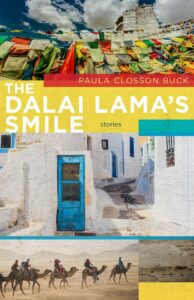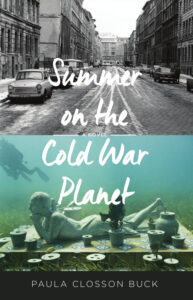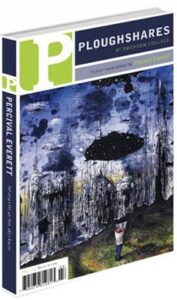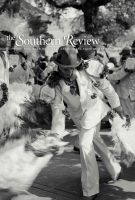SHORT STORY COLLECTION
The Dalai Lama’s Smile
Acre Books, March 2025
Order from University of Chicago
 In eight short stories, travelers and locals become entangled in situations that send their moral compasses spinning.
In eight short stories, travelers and locals become entangled in situations that send their moral compasses spinning.
A grieving American father visits Dharamsala to investigate the murder of the son he’s never understood and finds himself delving into the mystery of the young man’s life. A Turkish-Cypriot teacher is tasked with making an inventory of household goods in an occupied tourist resort the inhabitants have fled. A wannabe eco-activist in Kentucky writes confessional letters to Boyan Slat, the young CEO of The Ocean Cleanup. A woman in a Rajasthan tourist caravan bears helpless witness to a dire culture clash.
As Closson Buck’s characters encounter circumstances that challenge their understanding of themselves and the world around them, they are forced to negotiate fallout stemming from religious dogma, environmental crisis, and political violence. Ranging from fabulism to realism, the stories in The Dalai Lama’s Smile invite us to explore the perils and the possibilities that come from engaging the unknown.
“Whether monks discussing the ban on femininity at their sanctuary or a teenage grocery-store clerk writing about the plastic problem to a famous conservationist, the voices [Closson] Buck collects here create a striking chorus of humanity.”
— Bridget Thoreson, Booklist
NOVEL
Summer on the Cold War Planet
Fomite Press 2015
 The summer before the Wall collapses, Lyddie, a young American art historian whose husband has disappeared, returns to the divided city of Berlin seeking truths she believes he might have kept from her. There, she falls again under the spell of Axel, an exiled East German artist whose stories of Greek mystics once made him as irresistible as he was forbidding. In this novel of conflicting allegiances played out between a richly realized late Cold War Berlin and the stark beauty of the Greek islands, travellers, natives, and refugees circle one another warily, their fates hanging on the question of which trusts if any, will remain unviolated.
The summer before the Wall collapses, Lyddie, a young American art historian whose husband has disappeared, returns to the divided city of Berlin seeking truths she believes he might have kept from her. There, she falls again under the spell of Axel, an exiled East German artist whose stories of Greek mystics once made him as irresistible as he was forbidding. In this novel of conflicting allegiances played out between a richly realized late Cold War Berlin and the stark beauty of the Greek islands, travellers, natives, and refugees circle one another warily, their fates hanging on the question of which trusts if any, will remain unviolated.
“An international romantic tragedy glowing with polished prose and poetic highlights.”
–Kirkus Reviews
“History snares these characters, whether the author is tracing the plight of Kurdish refugees in Greece or the chaos before the collapse of the Berlin Wall. …This ambitious novel offers us scenes of suddenly luminous beauty, transforming the residue of the wounded characters’ mistakes into possibilities for newly enhanced life.”
–Lee Upton, author of The Tao of Humiliation
Absorbing and thought provoking, Summer on the Cold War Planet is a serious portrait of a woman who must navigate a labyrinth of secrets, even within her divided heart.
–Booklist
An intoxicating mixture of intrigue, romance, and politics, set in the Berlin and Greece of 1989.
–Foreword Reviews
Paula Closson Buck animates a fascinating set of characters whose lives both represent and resist the larger sociopolitical and generational sweeps they are carried by. The result is a rich and provocative exploration of freedom, allegiance, and betrayal.
–Elise Blackwell, author of Hunger and The Lower Quarter
SHORT STORIES
“The Slight”
in Ploughshares, Fall 2014, edited by Percival Everett
 “The Sahara it is not. At night, the little tourist caravan arrives at a wave of dunes cresting beneath the starry sky. But during the day, they carry on through splotches of the unvaried scrub that is Rajasthan’s Thar. Trees are occasional, of a variety that gives the camels gas and causes them to slobber greenly. They meet almost no one, only occasionally come to a well, into which Hameed or one of the two other camel drivers lowers a bucket. The sun is hot, even in February. The desert smell is dry. It ends abruptly in the olfactories, no moisture to carry it. But at night, the camp smells of canvas and ticking that has been rolled all day; and then the dry fire makes its thin but persuasive argument almost without smoke. Readily, it flares up. . . .”
“The Sahara it is not. At night, the little tourist caravan arrives at a wave of dunes cresting beneath the starry sky. But during the day, they carry on through splotches of the unvaried scrub that is Rajasthan’s Thar. Trees are occasional, of a variety that gives the camels gas and causes them to slobber greenly. They meet almost no one, only occasionally come to a well, into which Hameed or one of the two other camel drivers lowers a bucket. The sun is hot, even in February. The desert smell is dry. It ends abruptly in the olfactories, no moisture to carry it. But at night, the camp smells of canvas and ticking that has been rolled all day; and then the dry fire makes its thin but persuasive argument almost without smoke. Readily, it flares up. . . .”
“Appointment on the Bhagsu Road”
in Southern Review, Winter 2015
 Listen to an excerpt of”Appointment on the Bhagsu Road”
Listen to an excerpt of”Appointment on the Bhagsu Road”
“The nun wants to kill the dog. The dog has a cancer on its head the size and color of a testicle. It is growing daily. And the nun’s own days are inflected with grief—grief and also something more. At meditation she is not centered in the hara, two inches below her navel. Instead, she gravitates to that canker, a crass red, distorting the dog’s head, or the eye of the dog that pleads with her, and that is what she gives herself up to. Not the warm, slobbering tongue she used to allow to take chunks of oily potato from her hand when she cleaned up in the refectory, but the dog’s corrosive need. . . .”
“The Dalai Lama’s Smile”
in Kenyon Review, Winter 2015
“Morris receives his Christmas card nearly two weeks after what happened. The note from his son, Toby, says that work with the Tibetan monk is going well; it says the spirit of Christmas is still with him. What does it mean, still? Christmas hadn’t come yet for Toby when he wrote the card, and would not come. When Toby’s Aunt, Morris’s sister, received her card, she said she thought of the Dalai Lama padding barefoot around his temple and about his devotees who loved him better than Jesus. The divorced mother’s card said that turkey was the only meat Toby missed. Toby’s mother is almost sure that, in spite of being a Catholic genetically, her son had gone native.
“Morris’s card is unsigned, and it ends mid-sentence. Since the other cards were finished, he figures he was most likely below the mother and the aunt on the list of people Toby would write to. He won’t let that trouble him under the circumstances. But the card, sent anyhow and displayed on the mantle, does trouble Morris. It won’t let him rest—not while he sits on the couch, his feet made of dog; not when he goes out walking past the defunct smokestacks of the furniture factory and the wintered-over marsh. . . .”